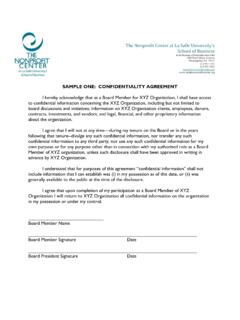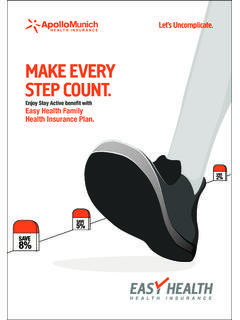Transcription of Five Fundraising Mistakes We Make with Our Boards
1 From GuideStar Newsletter March July 2008 These articles are from a series on helping board members embrace Fundraising . Gail Perry is the author of Fired Up Fundraising : Turn Board Passion into Action and founder of Gail Perry Associates, a Raleigh, North Carolina-based consulting and training firm. During the past 22 years, she has helped organizations raise more than $200 million. five Fundraising Mistakes We make with Our Boards Too often nonprofit board members shy away from Fundraising . When the subject comes up, many trustees suddenly become invisible or silent. Yet it is our responsibility to set up board members in active, satisfying roles that can support the Fundraising process. But we frequently make Mistakes that hurt, rather than help, our cause.
2 Why are trustees so nervous about Fundraising ? And how do we go wrong when we approach them about helping in Fundraising ? Here are five common Mistakes that cause board members to back off when they should be pitching in. 1. Asking for money, not building and keeping friends. Many board members are mistaken about Fundraising . They think it is "asking for money." The actual moment of asking for a gift, however, is only one small step in the long, time-consuming process of building relationships with donors. Board members don't realize the myriad activities that go into the Fundraising process identifying potential donors, cultivating and involving them in an organization, and, of course, finding ways to thank donors and foster their long-term relationship with our cause.
3 They skip directly to the most difficult and awkward part of the Fundraising cycle. Presenting board members with the task of "asking for money" instead of "building and keeping friends" is not the most effective way to inspire anyone board members or not to raise money. If we can get our board members to change their point of view and have them focus first on making friends who then join our organization's bandwagon as donors then everyone wins. We should never allow our good-hearted, well-meaning but nervous board members to get away with equating the entire process of Fundraising with the act of soliciting. Most Fundraising training for board members misses the mark by jumping straight to soliciting. It eventually inhibits, rather than pumps up, board member energy and excitement for the cause.
4 Introducing board members to Fundraising by presenting a seminar titled "The Art of the Ask" is not a way to bring them gently to the table so they will embrace Fundraising enthusiastically. 2. Cold or "cool" calls. Cold calls are the worst possible place to use the energy and good will of your kind-hearted board members, because cold calls have the highest rate of failure. If you send trustees out on calls that have a low likelihood of succeeding, they will experience defeat rather than success. We should never subject our board members to this kind of rejection, which will incline them never to venture out for you again. Preserve their self-esteem and protect them from negative responses if you want their continued help.
5 Why would they keep beating their heads against a wall if they are rarely successful? Send them on easy calls that will create fun, shared vision, and passion for your organization, calls that will make them happy and give them confidence. Send them on calls where you already know what the outcome will be. Send them out to make friends for your organization and engage the community with their passion. Set them to load everybody they know into that bandwagon they are driving. I work hard to preserve my board members' good feelings about being involved in Fundraising . I nurture their interest, starting them off with simple tasks to encourage them, such as thanking current donors or cultivating someone at an event. Then, after they develop some confidence, I bring them along on a formal cultivation or solicitation call.
6 I will rarely send a board member out to solicit alone, and only if I think he or she is a carefully prepared, experienced fundraiser. After one of my Fired Up for Fundraising Board Retreats, a trustee once said to me, "This was so helpful. Before when someone mentioned Fundraising , I immediately imagined cold calls. You have shown me that I can help in Fundraising in lots of much easier ways. Fundraising is not necessarily cold calls at all; in fact, good Fundraising is everything but cold calls." 3. Too many calls at too low a dollar level. If we are going to use board members in solicitations, then it is important to plan carefully the best use of their time in order to make the most of their valuable contacts and limited availability.
7 I have seen well-meaning but scared volunteers bravely step up to the plate, willing to make annual giving solicitations in person. Then the thankful but overly optimistic staff loads them up with far too many visits to make at one time. Worse, the calls are for meager amounts of money. It is much better to focus our board members on fewer calls at much higher dollar levels. I believe in asking board members to make only three calls at any one time. Focus on quality, not quantity. It is better to give board members one task at a time than have them struggle with too many actions that never get done. Use your valuable board members carefully where you need them the most, and where they will do the most good. 4. Emergency Fundraising , not long-term relationships.
8 I am all for a sense of urgency when raising funds. But all too often we wait until a crisis to mobilize our board members. Then the conversation really does become all about money rather than about the great work our organization is doing for community good. At such times, we ask board members to help pull in money quickly to respond to a budget shortfall or cover some major financial loss. Again we are setting them up for unpleasant Fundraising experiences. In these cases, they will usually create a conversation about "money," not about a vision for a stronger, healthier community or a better world. This misdirection causes Fundraising to be placed on the wrong plane, leaving board members with a distasteful experience that could have been avoided.
9 5. Lack of training, structure, coaching, and support. We often send our trustees out with too little preparation and backup. We tend to forget that they are volunteers. They are not the pros that we are. We need to give them thorough training to correct their misconceptions about Fundraising and pump them up with confidence to venture out into scary Fundraising territory. Do not make the mistake of assuming that your board members understand Fundraising , or how to talk about your organization. Be sure they have a solid understanding of the underlying philosophy of Fundraising which is developing donors/investors/partners who will stick with your organization for the long run. They need and deserve first-rate support from staff.
10 You will find that board members deeply appreciate this kind of backup. They need clear goals, clear organizational structure, and inspiration to wake up their passion and keep personal commitment to your organization's success. The Myths and Realities of Board Members and Fundraising Where is our dream trustee who can solicit gifts with passion and energy? Unfortunately few board members fit this ideal. One of the biggest myths perpetuated in Fundraising is that most board members are willing and able to raise money. The reality of the situation is that our board members have some very real challenges when they are confronted with Fundraising . Their actual performance in this area is quite different from our expectations of them.







